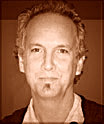
"I think my work is primarily concerned with voice, a combina-
tion of tone (attitude toward subject) and mind (the specific language and syntax at work inside the piece)."
More Perihelion:
Bob Sward's Writer's Friendship Series
A quick list to poets featured in this issue:
 Featured Poet:
Featured Poet:Michael Perrow
Mike Perrow received an MFA in Poetry from the University of Massachusetts, Amherst, and he currently lives in Medford, Massachusetts. His poems have
appeared in Volt, Del Sol Review, The Hollins Critic, and elsewhere, including work that will appear in the Spring 2002 issue of Shenandoah.
Following is a conversation Perihelion had with Mike regarding his roots, aesthetic values, and poetic development.
Mike, you grew up in the south and many of your poems reflect that. Even
though you now live in Boston, do you think of yourself as a "southern poet"?
A: I am constitutionally and verncularly a person from the south, but I
don't
conceive my poetic identity as particularly southern, no. Like most
writers,
I return to my childhood now and then where loads of images and ideas
are
still waiting for the right situation in a poem. But I'm more interested
in
the
spatial arrangement and interplay of things than whether or not they
refer
to
a particular place on the map. Regionalism feels like an old-fashioned
notion.
If editors and poets want to cultivate identities around a sense of
region,
that's fine -- many readers still insist that biography offers important
keys
to a poem's meaning. It just doesn't inform my own sense of the creative
process.
How would you characterize the kind of poetry you write (lyric, dramatic
narrative, etc)?
I'm interested in all of those, and I think readers should recognize
these
things
as elements in all good poems rather than as strict genres. Steven
Burt's
notion of
the "elliptical" poets suggests that he sees narrative, an incomplete
one,
in some
of the best "lyric" poems being published today. For example, Forrest Gander's work
is
both lyrical and
narrative and highly dramatic, and it's the constant intertwining of
these
elements
that buoys his longer poems. I think my work is primarily concerned with
voice,
a combination of tone (attitude toward subject) and mind (the specific
language and
syntax at work inside the piece). Which means I am happy to "write
about"
anything
as long as the voice interests me. Of course, the challenge is to guard
against solipsism,
which I don't often succeed at. That's why I try to write a lot, so
something worth
keeping will break through now and then.
Who are your major influences?
I've been interested in poetry for a long time, and I still hear the
voices
of
Frost and Roethke from my early adolescent reading. The quality of sound
from those
two is still a powerful shaper for how I listen to new lines in my head.
As a poetic intellect, Alan Dugan remains one of my strongest
influences,
for
his wit and craft in the metaphysical realm; Plath, too, is a favorite
in
this category.
Ultimately, Wallace Stevens is god. He's in a third category of
influence
along the lines of the French symbolists, where I also put James Tate
and
Ashbery.
Oscar Wilde says "Those who look beneath the surface do so at their
peril,"
and
Stevens is clever enough to create surfaces you just can't help trying
to
peak
beneath.
Mike, though you have an MFA, you earn your living in the corporate
world.
Can you tell us something about that decision--or condition? How did you
get
from A to B?
The decision wasn't hard. I didn't have the luxury of moving anywhere I
might
find a teaching job when I finished graduate school, so I started
working as
a
tech writer for a computer company. Over the years, I've learned high
tech
marketing, and I actually like my job editing the online magazine for a
decent software company. The experience you get in writing programs,
especially
the collaborative peer environment of writing workshops, can really pay
off
if you find yourself working as a writer for a largish company. In the
software
industry I've found lots of English, Music, and History majors who keep
me
on
my toes. And I've managed to teach, between corporate jobs, here and
there.
How do you think your work in information technology influences your
poetry
(if it does)?
Not one shred of influence on my poems, but I DO get a great laptop
computer
to
lug home and bang on late at night.
Where are you headed with your work---of the poets working now, who
interests you most?
Of the poets working right now, I'm exhilarated by a crazy
variety of styles ... Jane Mead, Forrest Gander, Stanley Moss, Lucie
Brock-Broido,
Sidney Lea, C.D. Wright, Steven Dunn, Steven Dobyns. I'm terribly glad
Alan
Dugan
is finally being given the spotlight he deserves, because most of his
work
has been
out of print for so long. If Dugan's first book were brand new today, I
think
it would still feel fresh and shocking, the way John Donne can feel. His
new
collected
poems should stir the imaginations of younger writers who've been wading
in
the
swamp of all that "language poetry" published over the past 20 years.
Hard
to say
where I'm headed. I hope I don't sound self aggrandizing by saying that
I've
never
followed trends. (Especially that trend where you get lots of your poems
published.) If
I were pressed, I'd have to say the poems "Reunion Number 3" and "When
It
Comes..."
represent a style I'm interested in furthering.
Thanks, Mike, for talking with Perihelion. Mike's poetry can be found here.